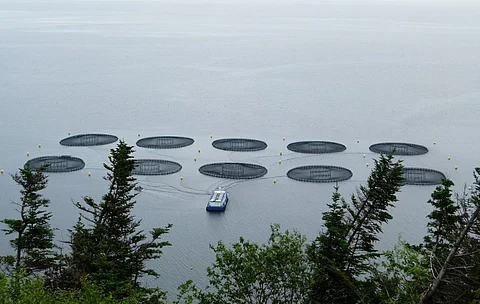

Fish farm in Belleoram, on the shores of Fortune Bay in Newfoundland and Labrador, Canada.
Photo: NAIA.
After several local authorities in Newfoundland and Labrador showed their opposition to the south coast National Marine Protected Area (NMCA) boundary proposed by the Government of Canada, the Newfoundland Aquaculture Industry Association (NAIA) issued a statement of appreciation in which it also denounced the influence of anti- farming salmon activists in the federal government.
"It's clear that Ottawa, Parks Canada, and DFO, are being lobbied by activists including the Atlantic Salmon Federation, the Ecology Acton Centre, and others who are willing to jeopardize local food security and employment by destabilizing economic opportunity to attract funding donors," NAIA's Board claimed.
In its view, non-governmental organizations of this nature that claim to be charitable should be legally required to operate independently of any government and should not receive government grants from taxpayers' money.
In its statement, the Newfoundland Aquaculture Industry Association specifically singles out one organization, the Atlantic Salmon Federation (ASF), which, it claims, "is far from Atlantic Canadian." According to NAIA's release, the main donors to this organization are wealthy Americans living in large U.S. cities.
Moreover, Charity Intelligence Canada - an organization assisting the Canadian charitable sector in being more transparent - reported that in 2023 ASF Canada took in $2.8 million in 'International donations' from the U.S. while only $830,000 came from Canadian donors.
NAIA also said that ASF's 2023 Impact Report lists Yvon Chouinard, the founder of Patagonia clothing, as a "platinum benefactor" donor of more than $100,000. "Chouinard also happens to be an investor in Nova Scotia land-based salmon tank farming company Sustainable Blue," the release pointed out.
In the Newfoundland aquaculture industry view, the American chapter of ASF is "sliding US funds across the border to influence Ottawa politicians and negatively impact Newfoundland and Atlantic Canadian jobs and communities where ocean salmon farming has existed for decades."
The Newfoundland Aquaculture Industry Association continued its statement by saying that the provincial and federal governments should end all subsidies to the Atlantic Salmon Federation. "The federal government must immediately suspend the charitable status of ASF and end its support of ASF's campaign against Newfoundland food security through local salmon farming production," it claimed.
"There is nothing charitable about the dishonest, outdated, inaccurate claims ASF continues to promote about the aquaculture industry. ASF donors should also be asking critical questions about how their funds are being used," NAIA's statement continued.
According to the Atlantic Salmon Federation Canada's 2023 financial statement of operations, the organization spent just $258,000 on "wild salmon watersheds" in all of Canada. "The reality is that they are fundraising off the backs of hard-working Atlantic Canadians in the seafood industry while spending very little on actual wild salmon conservation projects in Newfoundland and Atlantic Canada," NAIA claimed.
As mentioned above, this harsh statement by NAIA's Board against the Atlantic Salmon Federation is included in a release issued to acknowledge the support of several local authorities in Newfoundland and Labrador in opposing the federal government's proposed delineation of the south coast NMCA.
The Newfoundland Aquaculture Industry Association said that, by opposing Ottawa's proposed limits for the NMCA on the south coast, these representatives are ensuring that no one in the fishing and aquaculture industries, nor the livelihoods of the families who depend on these industries, are adversely affected.
It claimed that "activists embedded within Parks Canada by the federal government" are pushing this south coast NMCA to be established first and telling communities they will develop a site management plan impacting fishing, aquaculture, and recreational activities afterward.
Parks Canada has already admitted that some ocean areas will have restricted fishing activities. Facing that, NAIA highlighted the reality in another NMCA, the Gwaii Haanas, in British Columbia, where fishing has been restricted in almost half of the ocean area and all commercial aquaculture has been completely banned.
"Charting the best course for our marine environment should not come at the expense of the seafood industry and the livelihoods it supports; it doesn't have to," NAIA claimed. "Environmental activists have attempted to sell coastal communities on the promise of potential activity with National Marine Conservation Areas and Marine Protected Areas they cannot guarantee. Meanwhile, the seafood sector already brings people to the rural coastal communities where operations employ people regularly and year-round."
"We are appreciative that our local Newfoundland and Labrador elected representatives follow fact and science," NAIA's Board statement continued. "Protecting our oceans should be the common ground on which the industry, government and environmental NGOs agrees and aligns."
"It is shameful that ASF and others continue to conduct misinformation campaigns, which muddy the dialogue to mislead stakeholders, influence politicians, and ultimately attract the donations they rely on to fund their egregious campaigns," it concluded.
An advocate on behalf of its members to facilitate and promote the responsible development of the aquaculture industry, the Newfoundland and Labrador Aquaculture Industry Association (NAIA) is a member-based organization that represents the interests of seafood farmers and their suppliers in this Atlantic region of Canada.
